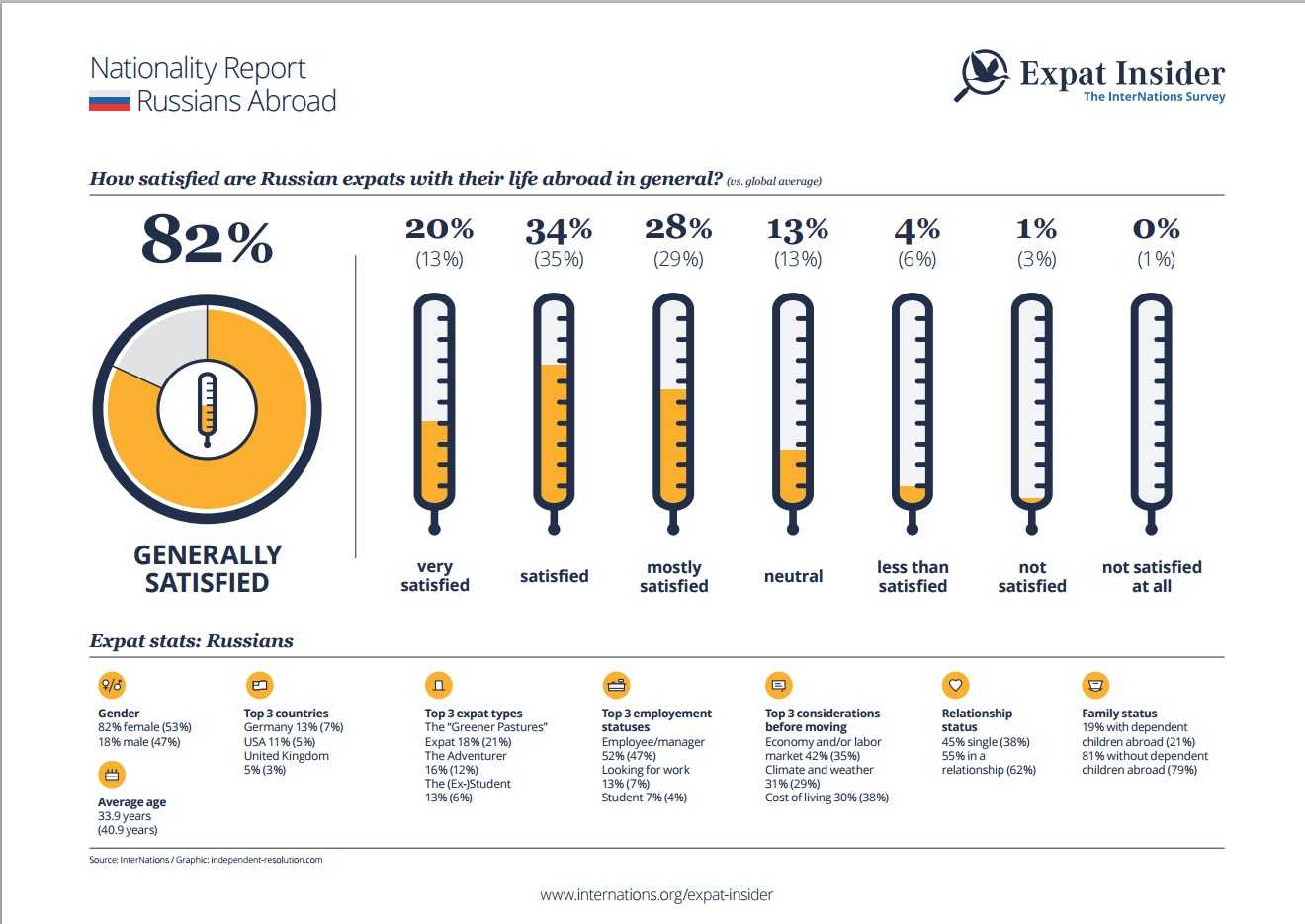Expats from Russia Are in It for the Long Haul
A foreign partner, learning local languages, and acquiring local citizenship are distinguishing features among the Russian expat community, preparing them for a long-term stay.
The Russian expat is committed to the cause: 39%, as opposed to one-quarter worldwide, intend to stay forever in their current country of residence. Furthermore, 18% of Russians rather than the 10% among the expat average have acquired their respective foreign citizenship. This is quite a commitment considering the hassle surrounding dual citizenship prompted by new legislation introduced in Russia last year.
Perhaps the complexity of the relationship with the motherland is the reason behind almost one-third of Russian expats (30%) taking the distance to their home country into consideration when moving abroad. The question remains whether this was a push or pull factor, but in any case the largest cohort of Russian respondents (13%) moves abroad to find a better quality of life.
Expat Statistics 2015

Young and Eager to Learn
The fact that Oxford was named as a dream destination for 2% of the Russian participants (as opposed to close to none (0.2%) in the global ranking) might reflect high academic ambitions among the 7% which identify as students. These respondents, in turn, probably contribute to the low average age (33.9 years, as compared to 40.9 years globally). The (Ex-)Student expat type features nearly twice as often among the Russians abroad (13%) as among the general population (6%). Following the same trend, the education/research/translation sector is where 19% of the Russian respondents work.
As can be expected, wanting to improve their language skills and going to university or school are relatively popular reasons for moving abroad: 16% compared to 10% on average, and 20% compared to 9%, respectively. Academic goals are twice as likely to be the most important reason for moving abroad for Russians compared to the global average (10% vs. 5%). Overall, moving for a better quality of life (13%) or for love (12%) are Russians’ most important reasons.
However, professional life and careers among the Russian expats are found a bit wanting. At half the global average, only 6% of Russian employees and managers hold top management positions – a larger fraction can be found working as experienced employees (31% vs. 21% globally). Another significant group is that of the almost one in seven Russian expats looking for work (13%).
Say “Da!” to Foreign Language Skills
Linguistic skills are in abundance among this group of expats, as less than 1% speaks only their mother tongue (0.4%) and most (52%) speak three languages, which is far above the global average of 31%. It being unlikely that their mother tongue is spoken in their current country of residence (3%), it is fortunate that only 6%, half of the worldwide average, say they do not speak the local language at all. Four out of nine Russian expats can boast of speaking the local language very well, a sense of accomplishment heightened in light of the fact that only 29% of expats on average can say the same.
From Russia with Love
No one meets new people quite like the Russians, who outrank the global average in their main ways of socializing: via their education (29% vs. 15%), online networking (30% vs. 21%), and through friends (63% vs. 56%). The outlier in these statistics is meeting people through a religious community (merely 2% compared to 9% worldwide), something which can be put down to historic trends in Russia.
Russians abroad are happy to look outside their own nationality for a partner: only 35% – compared to 43% globally – have a partner with the same nationality as theirs. Interestingly enough, Russian women (72%) are far more inclined than men (35%) to have a partner with a different nationality. In fact, expat women worldwide can take a page out of the book of their Russian counterparts when it comes to single life – more of the latter disagree with the statement that being an expat makes having a relationship difficult (47% of Russian respondents compared to 32% on average for female expats).
Further Reading
- Where Do I Come From, And Does It Really Matter? – thoughts and advice from a Russian expat
- How to Survive Your Visa Interview – a first-hand account and valuable advice from a Russian expat
- Home Bitter Home – a Russian abroad describes “home” and what it can mean for expats
- When Going Back Home Drives Us Crazy – words of advice from a Russian expat
- The Moscow Times: Deadline Set for Disclosing Dual Citizenship
- Pew Research Center: Russians Return to Religion, But Not to Church
Advertisement
Join InterNations
The community for expats worldwide
Download

